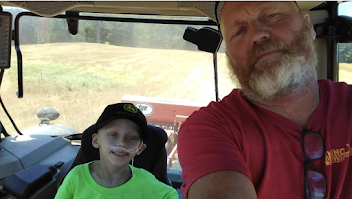 |
| Roger Wenning and grandson Travis, now gone, spent a day planting. |
"Farmers prioritize their livestock, plant and soil health, but among those should also be mental health," Allison Lund reports for Farm Progress. "With stressors so different from other professions, it is increasingly important for farmers to keep mental health top of mind."
Lund's object example is farmer Roger Wenning of Greensburg, Ind. "He has struggled with depression since the loss of his grandson Travis a few years ago and is now focused on sharing his mental health journey to help others," Lund writes. Wennign told her that acknowledging a mental health issue can prompt both supportive and unsupportive responses: "I was told by someone that I trusted, 'You just need to suck it up.' . . . When I was in the deepest of my depression, I got into some situations that were very questionable as far as danger. I could have been hurt or a lot worse."
Lund adds, "When friends started to notice that something was off, they volunteered to drive Wenning to appointments and find resources that could help him. That was when he realized he needed to put his mental health first." Part of his experience was moving past what others might "think about your problem" and prioritizing getting help.
"Wenning explains there is a stigma surrounding mental illness in the farming community, and overcoming that stigma to receive help can prove difficult. Farmers are also typically isolated, which can cause mental health conditions to worsen if left unchecked. . . . During this time, Wenning says he struggled with his faith and found himself angry with God. However, he later found it important to speak with clergy and church members to help with his mental health. He told Lund: "I lost my faith, and working my way back has helped in the healing process. . . . I'm not fully there yet, but I have definitely made strides in the right direction."
To help break down stigma and misunderstanding, "Wenning believes it would be best for mental health to be promoted through field days, flyers at ag businesses and more publicity on the topic," Lund reports. "He also believes that simply being there for friends in need could help tremendously. This can be as simple as talking over the phone." Wenning told her: "Chances are there is a problem, and that's why they called you. They might not be ready to talk, but just sit there and listen."
The U.S. Department of Agriculture has a list of Farm Stress Resources.
No comments:
Post a Comment